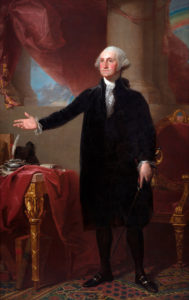
Though there were ten Presidents of the United States under the Articles of Confederation between 1781 and 1789, George Washington was the first under our present Constitution. He was sworn in on April 30, 1789 and gave the first State of the Union Address January 8, 1790; 232 years ago. He gave the address in person at Federal Hall in New York City to a joint session of the House (65) and Senate (26), or 91 members in total at the time.
Thomas Jefferson, to distance himself from monarchs and kings who gave addresses in person to intimidate to their viewpoint, began the tradition of giving the address only in writing, which was done until the time of Woodrow Wilson, our 28th President (1913-1921). The first radio broadcast of the State of the Union was in 1923 with President Calvin Coolidge, and the first televised address was of President Harry Truman in 1947.
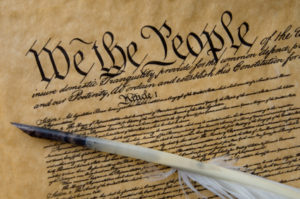 Article II, Section 3 and Clause 1 of the Constitution reads: “He (President) shall from time to time give to the Congress information of the State of the Union, and recommend to their consideration such measures as he shall judge necessary and expedient.” The President is to give a report on the health of the nation as well as any suggestions to Congress on measures they should consider.
Article II, Section 3 and Clause 1 of the Constitution reads: “He (President) shall from time to time give to the Congress information of the State of the Union, and recommend to their consideration such measures as he shall judge necessary and expedient.” The President is to give a report on the health of the nation as well as any suggestions to Congress on measures they should consider.
Since Washington began his term with an Inaugural Address on April 30 of 1789, there was obviously no State of the Union Address. But on January 8 of 1790, the first address was given and under his administration, set a precedent of being annual. Since that time, most Presidents have given such an address anytime during the months of January or February. But the most important aspect of the State of the Union Address is its content and the philosophy of government under which both the report of the nation’s health and suggestions to Congress are given.
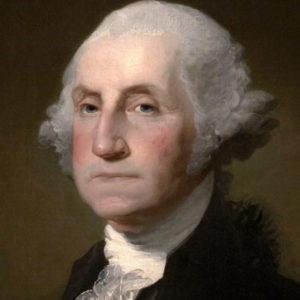 Washington’s first major point was to identify several ways in which the national prosperity of the new nation was marked. These included the “accession of North Carolina to the Constitution…” and “the general and increasing good will towards the Government of the Union – and the concord, peace, and plenty, with which we are blessed.” The clear assumption as well is that these blessings come from God.
Washington’s first major point was to identify several ways in which the national prosperity of the new nation was marked. These included the “accession of North Carolina to the Constitution…” and “the general and increasing good will towards the Government of the Union – and the concord, peace, and plenty, with which we are blessed.” The clear assumption as well is that these blessings come from God.
The first suggestion for consideration that President Washington gives to Congress is “that of providing for the common defence” and he states a fundamental principle when he declares, “To be prepared for war is one of the most effectual means of preserving peace.” To whom does Washington attribute as the root of the common defense of the nation? He states that “A free people ought not only to be armed but disciplined; to which end a Uniform and well digested plan is requisite: and their safety and interest require that they should promote such manufactories, as tend to render them independent on others, for essential, particularly for military supplies.”
If the nation is to be protected, the people ought to be armed. However, in order to defend the nation, there ought to be a plan given to train them in how to defend themselves. Keep in mind that at this time the people were considered to be the militia of the nation, called up when needed per Article I, Section 8 and clauses 11-12. Military supplies ought to be independently produced by the private market as well.
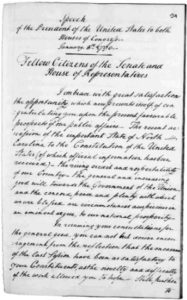 Another suggestion by the President involved our “intercourse with other nations… facilitated by such provisions as will enable me to fulfill my duty.” According to the Constitution, the Senate was to write the policies of our foreign policy, and the House was to initiate the supply of funds necessary to carry them out. These were to be, as Washington noted, “defined by law.” Today, Presidents assume total power to dictate foreign policy and have an unending blank check to carry them out.
Another suggestion by the President involved our “intercourse with other nations… facilitated by such provisions as will enable me to fulfill my duty.” According to the Constitution, the Senate was to write the policies of our foreign policy, and the House was to initiate the supply of funds necessary to carry them out. These were to be, as Washington noted, “defined by law.” Today, Presidents assume total power to dictate foreign policy and have an unending blank check to carry them out.
Washington was clear that the Congress was also to clarify the “uniform rule of naturalization” so that the “terms on which foreigners may be admitted to the rights of Citizens” would be clear. Let us remember that the laws of immigration was always integrating them to the rights of Citizens, not the rights without the obligation of citizenship.
Furthermore, the Congress was to “recommend… the advancement of Agriculture, commerce and Manufactures, by all proper means… the introduction of new and useful inventions from abroad, as to the exertions of skill and genius in producing them at home.” The Congress had no power to produce these things, but recommend the people and the free trade with other nations to accomplish it – those are the “proper means!” Congress was to promote and encourage “science and literature” by making sure everyone played by the same rule in the free market of ideas.
To me the most powerful part of this first State of the Union Address was how Washington closed it before addressing the House and Senate separately. He stated “that every valuable end of Government is best answered by the enlightened confidence of the people: and by teaching the people themselves to know and to value their own rights; to discern and provide against invasions of them; to distinguish between oppression and the necessary exercise of lawful authority… to discriminate the spirit of liberty from that of licentiousness, cherishing the first, avoiding the last, and uniting a speedy, but temperate vigilence against encroachments, with an inviolable respect to the laws.”
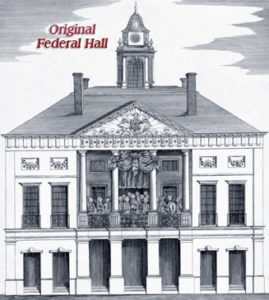 There in New York City’s Federal Hall, Washington delineated the fundamental and exceptional nature of our Constitutional Republic. He stated that the “end” or purpose of civil government could only be achieved if the people value their own rights and are confident that government exists to protect them. He also articulated that the people themselves, as an act of self-government, ought to know how to discern between oppressive government and the lawful exercise of authority. They must discriminate between the spirit of liberty on one hand and licentiousness on the other. We must stand against encroachments of liberties, but do so lawfully.
There in New York City’s Federal Hall, Washington delineated the fundamental and exceptional nature of our Constitutional Republic. He stated that the “end” or purpose of civil government could only be achieved if the people value their own rights and are confident that government exists to protect them. He also articulated that the people themselves, as an act of self-government, ought to know how to discern between oppressive government and the lawful exercise of authority. They must discriminate between the spirit of liberty on one hand and licentiousness on the other. We must stand against encroachments of liberties, but do so lawfully.
Unless we restore Biblical principles of Christianity we will have no foundation upon which to discern. We will be left to choose between tyranny or anarchy. We encourage you to read Christianity and the Constitution (by John Eidsmoe) and A Worthy Company (by M.E. Bradford), both of which are carried by our online bookstore. May God help us restore true liberty under law!







